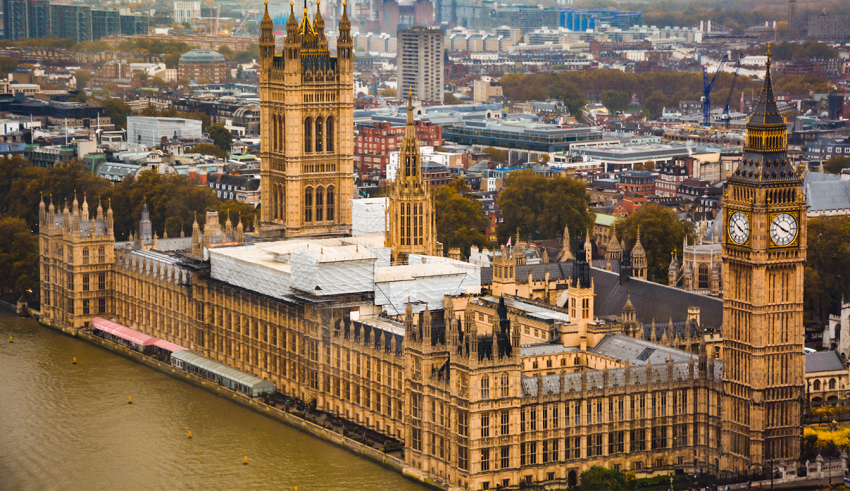PRESS RELEASES | 05/10/2020
Businesses call for urgent policy decisions to put UK economy on track for net zero emissions

Following extensive cross-industry and civil society engagement, the Aldersgate Group launches a new report today, setting out some of the key policy decisions that need to be taken in this parliamentary term to put the UK on a credible pathway to building a competitive, net zero emissions economy. The Group calls on the government to bring these together as part of a comprehensive net zero delivery plan.
The report, Building a net zero emissions economy [1], provides an in-depth overview of the near-term policy interventions required across a range of economic sectors to reach the net zero emissions target. Building on growing business [2] and public calls [3] to align the UK’s economic recovery strategy with the net zero target, the report argues that policy decisions in the early 2020s will be essential to grow private sector investment in low carbon technologies and services, strengthen the UK’s economic recovery and support efforts to tackle regional and social inequalities. Having a comprehensive net zero delivery plan in place will also strengthen the UK’s influence as host of the G7 and COP26 summits in 2021.
Based on recent government announcements but also the recognition that the UK is currently off track for meeting its interim targets under the fourth and fifth carbon budgets, the Aldersgate Group calls for an overarching strategy to align policy interventions in the buildings, transport, power, heavy industry, agricultural, land management and finance sectors and calls on the government to put in place a trade and diplomatic policy that is consistent with its net zero target.
Key recommendations include:
1. Pressing ahead with policy and regulatory measures to cut emissions in buildings, surface transport, power and waste. These are ‘low regret’ areas where the required technological solutions and business models to cut emissions are well known. Building on recent consultations and economic stimulus announcements, government should introduce binding energy efficiency standards for new and existing buildings, continue to support energy efficiency retrofits through the Green Homes Grant and fiscal incentives such as stamp duty rebates and make a decision to phase out the sale of petrol and diesel vehicles by 2030.
Other key recommendations include setting a clear carbon price trajectory for the 2020s that is aligned with the net zero target and ensuring that final decisions on the regulatory framework for the 2021-2026 ‘RIIO-2’ price control period supports the necessary investments that will be required to modernise and complete the decarbonisation of the power sector.
2. Focusing innovation efforts to support large scale trials of technologies and business models that will be essential to cut emissions in ‘hard to treat’ sectors such as heavy industry, agriculture and aviation. These include at scale trials of Carbon Capture and Storage, hydrogen production and use, battery technology and more resource efficient business models. The report highlights that consolidating recent funding for these technologies will be key in supporting an efficient innovation programme and that trials should work hand in hand with developing new market mechanisms, such as low carbon product standards for industrial goods and CO2 storage incentives. These are essential to grow market demand for low carbon goods and services, provide a level playing field and strengthen the competitiveness of UK businesses.
3. Growing the potential for negative emissions by creating a market for nature-based solutions and supporting scalable trials of potentially promising negative emissions technologies (NETs). The use of nature-based solutions should be supported through a robust carbon price to adequately reflect their contribution to carbon removal and their co-benefits. This will attract more consistent investment from companies looking to offset emissions and deliver against environmental improvement objectives. Nature-based solutions illustrate the importance of ensuring that the net zero delivery agenda works hand in hand with the finalisation of the Environment Bill and the Agriculture Bill.
The Government should use its upcoming £100m competition for greenhouse gas removal technologies as the first step to trial the potential of technologies such as Bioenergy with Carbon Capture and Storage (BECCS) and Direct Air Capture and Carbon Storage (DACCS) [4] and identify some of the market mechanisms that would be needed to support their future deployment.
Given the high cost of NETs and the limited space available for nature-based solutions, the use of negative emission solutions should not undermine the imperative of reducing emissions across all sectors.
4. Strengthening the Government’s Green Finance Strategy by creating a well-capitalised National Investment Bank, with a clear mandate to support investment in complex low carbon projects and direct low carbon investment towards regions in need of economic regeneration.
Other key priorities should include making TCFD-aligned climate risk disclosures mandatory ahead of COP26, continuing to support the British Standards Institute in the development of new green finance management standards, acting on the lessons from the Bank of England’s upcoming climate stress testing of the UK’s largest banks and insurers, and improve the risk profile for green investment through the introduction of a ‘brown penalising factor’ as part of a reform of capital weighting requirements.
5. Tackling the ‘levelling up’ challenge, by managing a just transition towards a durable recovery and a net zero emissions economy. This should include government working closely with businesses, local bodies and educational institutions to help direct low carbon investment and skills funding towards areas of the country worst affected by the pandemic and likely to be impacted by the net zero transition. Adequate funding and training for Local Authorities and Local Enterprise Partnerships will be essential to ensure that the recovery drives local regeneration and maximises the opportunities afforded by the low carbon transition for businesses and SMEs right across the country. In addition, a new national skills strategy will be essential to help embed sustainability training at all levels of the educational system and through lifelong learning [5].
6. Putting in place a diplomatic and trade policy that is fully consistent with the UK’s net zero and Environment Bill targets. As argued in a recent Aldersgate Group briefing [6], it is essential that future trade agreements promote high standards on the environment and climate change, reduce barriers for trade in low carbon goods and services and protect the UK’s future right to regulate on environmental and climate change policy issues.
Through its network of climate diplomats and attachés and its position as host of the G7 and COP26 summits in 2021, the UK has a unique opportunity to engineer a global increase in climate ambition. Negotiation priorities for COP26 should include putting forward a strong business case for major emitters to align their economic recovery plans with the need to achieve net zero emissions, agreeing on a mechanism to support developing countries already vulnerable to adverse climate impacts, and finalising a rule book for the market and cooperation mechanisms under Article 6 of the Paris Agreement.
Nick Molho, Executive Director, Aldersgate Group said: ‘Securing a durable recovery from COVID-19 and putting the UK economy on track for net zero emissions are mutually reinforcing goals that are strongly supported by businesses and the public. Actions in this parliamentary term will be essential to achieve both these objectives. The Government has stated its ambition to deliver a green recovery and has made positive stimulus announcements in recent months. But to put the UK economy on a credible pathway for net zero and allow private investment to do most of the heavy lifting, the government must now put together a comprehensive plan to close the existing policy gap.”’
Sue Riddlestone OBE, CEO and co-founder, Bioregional, said: “Our homes are directly responsible for 20% of UK carbon emissions. The report mentions the new Future Homes Standard which, with some adjustments, could see all new homes designed to be net zero carbon in energy use from 2025, in line with the recommendations of the Committee on Climate Change. For our existing homes, we need the government to share its plans and policies to implement the target in the Clean Growth Strategy that all homes reach at least EPC band C of energy efficiency by 2035. We are all in this together and there are a lot of experienced professionals on hand, only too willing to help to co-create policies and programmes that will get the job done.”
Duncan Price, Partner at BuroHappold, said: “We cannot tackle climate change without tackling cities. We need a radical approach to new build development, energy efficiency of existing buildings and future infrastructure delivery. We need clear policy signals, decarbonisation pathways, and business strategies across each of these areas as part of a green recovery.”
Meryam Omi, Head of Sustainability and Responsible Investment Strategy, Legal & General Investment Management, said: “The success of the UK’s ambitious net zero target depends on the government setting out a clear pathway for companies to build aligned strategies and for investors to direct capital into a ‘green’ recovery at scale. From domestic housing to international trade, this report offers timely recommendations to create a vibrant net zero economy, which we believe is beneficial for the UK and UK investors.”
Chris Smith, Managing Director of Michelin Tyre PLC, said: “This report by the Aldersgate Group clearly highlights the levers which will have to be activated in order to face up to the climate emergency. Smart regulation, accelerated innovation and fair environmental trade will be absolutely key. At Michelin, we are confident that COP26 will pave the way towards the necessary decarbonisation of our economies but this will require close collaboration between the public and private sectors as demonstrated in the report”.
Keith Anderson, CEO, ScottishPower said: “If we’re to have any chance of meeting net zero targets, we need to get to work on making it happen – building low carbon homes, getting people into electric cars and constructing new wind farms. As we set out in our 10 practical steps to unlocking net zero, we can do all these things, and do them quickly, with just small changes to existing government rules and regulations. Starting now, we can create jobs and stimulate investment while delivering the long-term environmental benefits and the zero-carbon future we’re all working towards – it’s a no-brainer. Taking action and doing what is needed from both an economic and an environmental perspective is a win-win, meaning we can all achieve a better future, quicker.”
Adam Read, Director of External Affairs at SUEZ, said: “This report is a timely addition to this critical debate. Carbon Net Zero is perhaps the most important target society has ever had to meet, and all sectors must play their part, under a clear framework of priority activity led by Government. The waste sector has achieved a great deal in the last 2 decades in terms of emissions reductions, as a direct result of moving materials away from landfill and its associated methane emissions. But for our sector to make future large scale improvements, we will need to drive a reduction in consumption, improve the performance of current technology solutions and support large scale trials of critical technologies and new business models to cut emissions in hard to treat sectors such as heavy industry, agriculture and long-distance transport.”
Adam Read added: “All sectors must step up to the challenge and look both internally at what they can achieve, and cross-sectorally at what sectors can do together or learn from one another. SUEZ are continuing to embrace this challenge and support our customers and supply chains in active discussions around changes in services and solutions, and welcome greater clarity from Government on short and medium term priority activities and future funding to support innovation and collaboration.”
Anna Turrell, Head of Environment at Tesco, said: “Food is at the heart of our business and we have a role to play in addressing the key sustainability challenges caused by food production and consumption – delivering affordable, healthy, sustainable food for all. As the UK’s largest retailer, Tesco has a sizeable operational and supply chain footprint. Tesco was the first company to set an approved carbon reduction target aligned to 1.5 degrees in 2017. Since then, we have transitioned our UK, Ireland, Slovakian and Hungarian operations to 100% renewable electricity, and are working to procure an increasing proportion of our demand from onsite and offsite Power Purchase Agreements (PPAs) that generate additional renewable energy in the UK grid.”
Anna Turrell added: “Electricity in our own operations is only part of the footprint. We would like to make further, faster progress and to do that we need an enabling policy and regulatory environment that supports and improves infrastructure for decarbonised logistics and energy systems, as well as supporting our agricultural supply chains to decarbonise whilst restoring nature. Having a comprehensive, joined-up national net zero delivery plan is therefore vital to both the success of the UK’s net zero ambitions and ours as a company.”
Richard Aylard, Sustainability Director at Thames Water, said: “We’ve reduced emissions by more than a third since 1990, despite the substantial growth in our business over that period, but hitting our ambitious target of net zero carbon emissions by 2030 will require more radical action.
Poo power, together with wind and solar, currently generates around a quarter of our electricity needs, saving our customers around £30m in energy costs each year. Future ambitions include turning fatbergs into biodiesel, creating more wetlands, transferring heat from sewers to warm homes and businesses, and installing power points for low carbon vehicles.
To succeed, these actions will need to be supported by improvements in policy and regulation like those proposed by the Aldersgate Group. Changes including the smarter approach to waste treatment, and access to low-cost renewable power, will help companies like us to achieve further major reductions in emissions.”
Maria Connolly, Head of Clean Energy & Real Estate at law firm TLT, said: “Aldersgate Group’s report calls on the UK government to take bold and decisive action to deliver net zero by 2050. The recommendations in the report are a reflection of the issues that have been raised by the sector as being key to a green recovery over recent months. We’re already seeing positive progress being made in many of these areas from a focus on green investment to the development of nascent technologies such as hydrogen, but further support from the government will be instrumental to drive the pace of change.”


